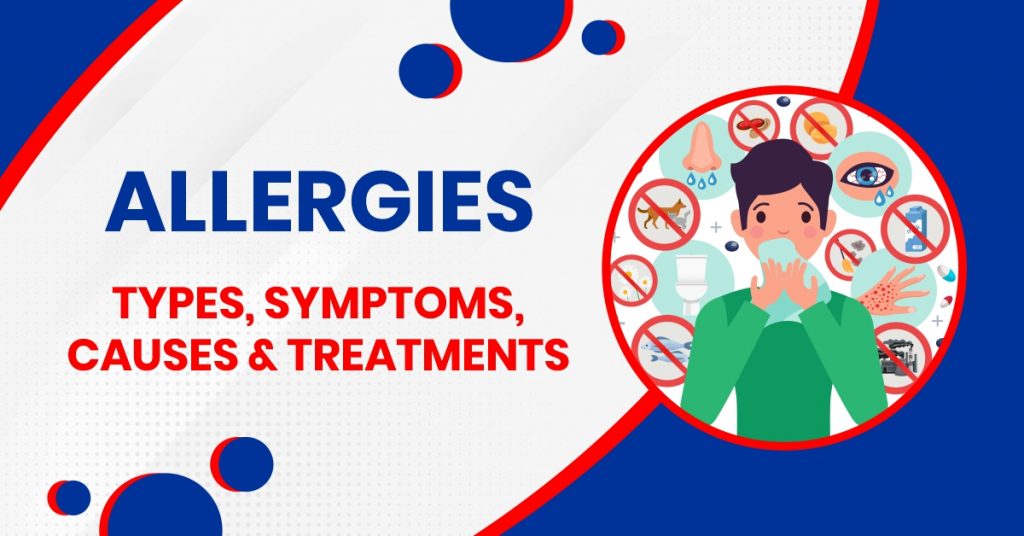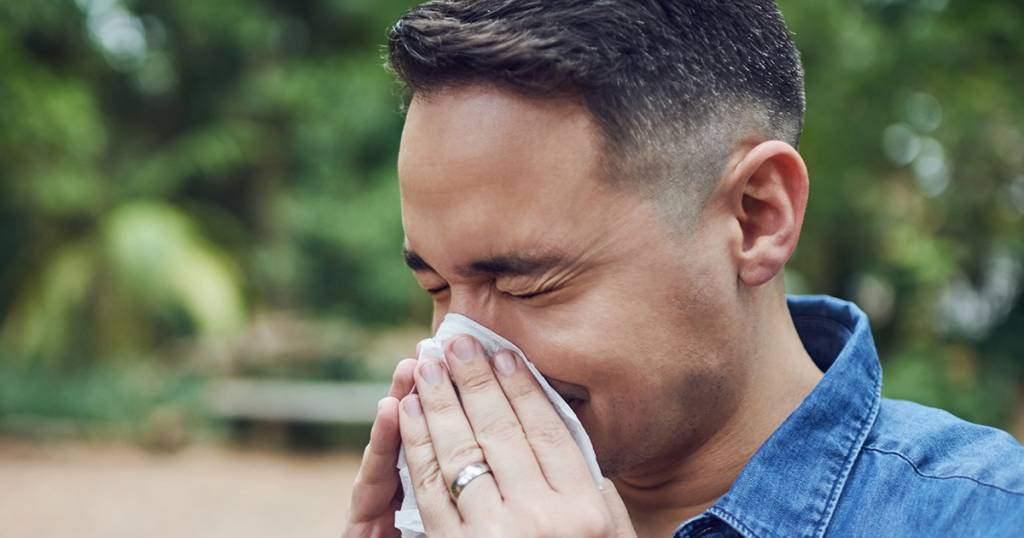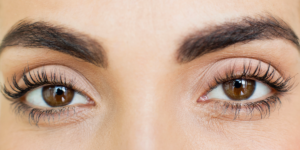
Your body reacts to a foreign particle or protein—such as pollen, bee venom, or food that generally doesn’t bother most people—by creating allergies. These particles are usually benign, but occasionally they could cause negative effects. An allergen is a foreign material that triggers an allergic reaction. When an individual allergen is present in the body, the immune system creates antibodies to fight against foreign substances; but, in the case of allergies, the antibodies mistakenly perceive the allergen as dangerous. Your immune system produces antibodies in response to allergens, which might cause inflammation, sinusitis, airway obstructions, or digestive system issues.
Individual differences exist in the severity of allergic reactions. This intensity varies from mild discomfort to an allergic reaction that coulda potentially fatal situation). While there are no cures for allergies, there are allergy medications that can help you get rid of the symptoms.

Symptoms
Allergic reaction symptoms depend on the allergen involved, ranging from mild to severe. Some of the allergy symptoms which may appear are as follows:
- Hay, allergic rhinitis that leads to
- itching of the nose, eyes, or roof of the mouth
- sneezing
- runny, stuffy nose
- watery, red, or swollen eyes (conjunctivitis)
- A food allergy can cause reactions as follows:
- swollen lips/tongue/throat/mouth
- Tingling in the mouth
- Hives
- Anaphylaxis
- Allergic reaction to an insect sting
- Swelling at the sting site
- itching or hives all over the body
- wheezing, cough, chest heaviness or shortness of breath
Allergic reaction to drugs
Causes
An allergic reaction is a response by your immune system against a harmless substance. The immune system mistakes that substance or allergen as harmful and produces antibodies that cause allergy symptoms.
Common allergens or triggers include:
- Airborne allergens such as pollens, animal dander, dust mites, moulds
- Foods such as peanuts, tree nuts, wheat, soy, shellfish, eggs, and milk
- medications, penicillin, or penicillin-based antibiotics
- latex or substances you touch which cause allergic skin reactions.
Diagnosis
To diagnose whether you have an allergy, your physicians will likely:
- Ask detailed questions about signs and symptoms.
- Perform a physical exam.
- Note down your possible symptoms and possible triggers.
There are some tests also:
- Skin test – the skin is pricked with small amounts of proteins found in common allergens. If there is any reaction at the location of the test, then you are allergic to that substance.
- Blood test – Specific antibody tests are performed, known as the Radioallergosorbent test or ImmunoCAP testing; this test brings the exact numbers of allergy-causing antibodies into your bloodstream. This provides evidence of sensitivity to possible allergens.
Treatment
The allergy treatment methods are as follows:
Allergen avoidance
After identifying your allergens or triggers, it’s best to avoid them to prevent allergic reactions and reduce symptoms.
Medications
There are no allergy reaction treatment methods, but there are medicines that can reduce your immune system reaction and ease the symptoms. There are various non-prescription and prescription anti-allergy medicine for treating the symptoms of allergens. There are various drugs in the form of pills, liquids, nasal sprays, or eye drops.
- Antihistamines are the best allergy medicine that reduces the antibodies in the body against allergens.
- Decongestants are also allergy relief medicine used cautiously when treating an allergic reaction due to higher side effects and concerns related to long-term use. Oxymetazoline, phenylephrine, and pseudoephedrine are used in serious conditions.
- Immunotherapy – This treatment involves purified allergen extracts, usually given over a few years, and this leads to the treatment of severe allergic reactions.
- Epinephrine – This is required only for serious allergic reactions. The patients require to carry an emergency epinephrine shot at all times. An epinephrine shot can reduce symptoms during severe reactions until the required treatments appear.
Home Remedies
Most of the allergic reactions are not severe and can be treated with basic home remedies:
1. Symptoms of hay fever and sinus congestion
It is preferable to use saline nasal irrigation to lessen these symptoms. To remove irritants and thickened mucus from their noses, patients can purchase a squeeze bottle or use a neti pot. However, using neti pots or other gadgets calls for the right instruction and understanding.
2. Symptoms of household airborne allergies
The best method to relieve these symptoms is to avoid allergens, which include dust mites and pet dander. Most of the time, you can minimize allergy responses by cleaning your bedding and stuffed toys frequently in hot water, keeping humidity low, using a vacuum with a fine filter—such as a high-efficiency particle air filter—frequently, and replacing carpeting with hard flooring instead of carpet.
3. Symptoms of a mold allergy
Mold allergy symptoms can be avoided by utilizing ventilation fans and dehumidifiers, as well as reducing moisture in wet places like bathrooms and kitchens. Resolve leaks in and around your house.
Acupuncture is one alternative allergy treatment for a variety of allergens, including allergic rhinitis.
Prevention
There are some general measures to prevent allergic reactions:
- Avoid known triggers; the best way to avoid allergic reactions is to avoid allergens.
- Keep a diary- Track your activities and eating habits to identify your allergens, avoid allergic reactions, and consult your doctor with descriptions of your symptoms and allergens.
- If you are dealing with animal allergies, avoid petting, hugging, or kissing animals, and don’t allow them in your bedroom or on your furniture.
- Seek medical help in the case of an emergency.
If you are aware of what triggers your immune system, allergies can be rather frustrating. You can, however, get allergy relief with the assistance of a medical professional. Once your situation has been evaluated, they can recommend the finest allergy medication.




